WASHINGTON (Sputnik) — Billions of gallons of polluted water used by the fracking industry disposed of in underground injection wells could be causing earthquakes and pose long-term risks to water quality, experts told Sputnik.
“There is clearly a documented link between injection wells and seismic activity, and most of the seismic activity that has been identified in Texas over the last several years has to do with injection or disposal wells, not with the fracking process directly,” University of Texas at Austin Center for International Energy and Environmental Policy Fellow Fred Beach told Sputnik.
Fracking, or hydraulic fracturing, extracts oil and gas by breaking underground shale formations with highly pressurized water and chemicals. A report by the environment group Environment American found that the fracking industry produced 280 billion gallons of toxic wastewater in 2012 alone.
The oil and gas industry has traditionally disposed of the polluted water by injecting it deep underground in disused oil and gas wells, or injection wells, Beach said.
A US Geological Survey (USGS) report published last week said there is remarkable increase in earthquake activity in large areas of the United States that used to experience few if any earthquakes.
“The disposal of this wastewater by deep injection occasionally results in earthquakes that are large enough to be felt, and sometimes damaging. Deep injection of wastewater is the primary cause of the dramatic rise in detected earthquakes and the corresponding increase in seismic hazard in the central US,” the USGS report said.
Scientists understand the mechanism behind human-induced earthquakes, but it is still difficult to completely understand it subsurface structures, University of Texas at Austin structural geologist Julia Gale told Sputnik.
“Scientists have a good scientific understanding of how it works, but what is often lacking to be definitive is precise enough data given a specific situation. We understand the process it’s just that in a given situation there are a lot of variables,” Gale said.
Gale explained there are many faults in the Earth’s crust that are not actively slipping but are in an orientation that, if the stress state changes around them, may slip and thereby cause earthquakes.
“If you introduce fluid into the subsurface the primary thing that it does is change the stress state. And under certain circumstances that might make a fault slip,” Gale said. “There may be more than one mechanism causing earthquakes,” she added, “there may be some natural seismicity as well as some that’s induced by water disposal.”
Beach argued that the earthquakes are more of a nuisance — typically not surpassing 2.5 on the Richter scale — and the real long-term risk is water pollution.
“The risk or hazard presented by these micro-tremors is miniscule. The real risk is these disposal wells and what we are putting down them and what the long-term risk of that is. It’s not a seismic risk, it’s a pollution risk,” Beach said.
“Pumping anything underground where you can’t see it and assuming it is going to be okay down there is a false hope,” Beach added, pointing out that in the past, humans discharged pollutants in the oceans only to realize decades later the environmental impact.
“I think we’ll see the same situation we witness with oceans with disposal wells 20-30 years down the road. People are going to say, ‘You were doing what back then, you were pumping what down there?’” Beach said.
Beach concluded there is a bright side to the earthquakes in that they bring attention to the issue of disposal wells, which are very poorly regulated, supervised and inspected.



